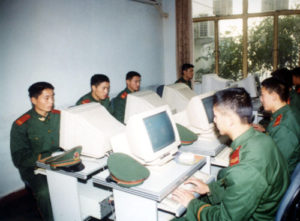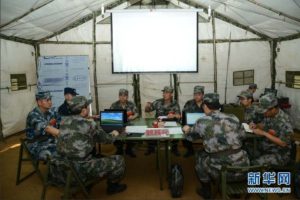網絡空間治理的力量博弈、理念演變與中國戰略
Power Game of Network Space Governance, Evolution of Ideas & China’s Strategy
First, the power of cyberspace governance Game
network space management process with the government between the game process. According to the situation of network technology, network capacity and network utilization, governments can be divided into three categories: information developed countries, information developing countries and information undeveloped countries. [③] There are also international organizations to use the network readiness (Readiness) as an indicator to measure the degree of information technology. This ranking basically overlaps with the traditional developed, developing and underdeveloped countries, and of course there is also the level of informationization in individual developing countries rising to the ranks of developed countries, or the level of information in some developing countries The level of the developed countries. Therefore, in accordance with the information developed countries, developing countries and underdeveloped countries to divide the three points in the academic more accurate. There are three aspects of the power game of cyberspace governance: one is the game between the developed countries and the information developing countries in the network ownership, the network resource allocation; the second is the non-governmental actors and the government on the Internet key resource control, network security And freedom and other issues of the game; Third, as the dominant space in cyberspace, the US government in its own private sector, civil society and other countries in the Internet between the key resources and other issues on the game (Figure 1).

First of all, information between developed countries and information-developing countries around the network space between the key infrastructure and network technology between the game. According to the behavior, the topic and the characteristic of the power game in cyberspace management, it can be divided into three stages.
The first stage is the early period of Internet governance, which is roughly from the beginning of the formation of the Internet to the United Nations World Summit on Information Society (World Summit on Information Society, WSIS), which is divided into two phases: the Geneva Conference in 2003 and the Tunis Agenda in 2005. The World Summit on the Information Society appears to be a struggle between governments and the private sector and civil society, in essence, the game between the United States and other countries on Internet control.
This period is the stage of rapid development of the Internet, a large number of new technical and technical standards have been created, the US government took the opportunity to vigorously promote the development of information technology, and developed a series of international technical standards, industry and industry norms. And information developing countries are still in the study, learn from the stage, which makes the United States and other developed countries in the field in an absolute strong position. [4] This stage of Internet governance mainly around the Internet domain name registration and analysis and its corresponding 13 root server control, Internet Protocol (IP) address allocation and other key resources to compete. The United States has almost controlled all international organizations and core businesses that have developed and managed Internet standards and refused to internationalize the relevant management functions or to the United Nations specialized agencies. [⑤] Therefore, at the World Summit on the Information Society, despite the pressure from the United Nations, the developing countries and even the European countries, the United States still refused to hand over the Internet management rights. Into the 21st century, the information represented by China’s developing countries to enhance the network technology, they have the domain name, users and other Internet resources have exceeded the information developed countries, but the representation in the Internet governance is far from enough, So the existing Internet governance reflects the legitimacy of the questioned.
The second stage is the stage of political competition and sovereignty competition of cyberspace governance, which is called the “return” stage of the government in cyberspace. This stage from the Information Society World Summit to 2011. In 2011, China, Russia and other countries to the 66th session of the General Assembly to submit the “International Code of Conduct for Information Security”, advocated the United Nations in cyberspace governance play a leading role. In the same year, the United States and Britain and other governments dominated the global network space management conference (Global Cyberspace Conference), also known as the London process (London Process) was held. <A The network space has become the “fifth strategic space” of human society. With the continuous breakthrough of network technology and its disruptive transformation of real society, cyberspace has become the fifth strategic space of human society. The distribution of order, power and wealth in cyberspace, the developed countries and information developing countries have serious differences on the following issues: whether the cyberspace attribute is “global public domain” or “sovereignty”; governance is government-led “Multilateral governance”, or a multi-stakeholder model dominated by non-governmental actors; governance culture is a “multicultural” or “multicultural” that is dominated by the West. [⑥] The focus of this period is also reflected in the free flow of information content in the field, when Hillary Clinton took the US Secretary of State, the Internet for the freedom of many speeches, advocating the US Internet freedom strategy. The role of the US government and social media sites in the wake of the turbulence in North Africa, which began at the end of 2010, has aroused widespread concern in the developing countries and strengthened the management of the Internet. [⑦] The third stage from the “Prism Gate incident” until now, this stage of the competition more focused on cyberspace security governance. “Prism door incident” to the United States in the field of cyberspace governance moral high ground questioned, leadership decline, forcing it to promote cyberspace governance in the low posture. At the same time, cyberspace security situation is further deteriorating, and the security threats facing countries are further increased. After experiencing the fierce confrontation of the “prism gate incident”, the developed countries and the information developing countries are aware that the maintenance of cyberspace requires the participation of all countries, and no country can lead the cyberspace governance process alone. Information developed countries and information development countries in the cognitive level of the gap gradually narrowed, the reduction of confrontational initiatives, cooperation began to grow space. Second, the “prism gate incident” caused the government and the private sector, civil society between the network security, privacy and other issues on the fierce game. Former US National Security Agency former employee Edward Snow led to expose a including “prism”, “X key points” (X-Keyscore), “Fair” (Fairview), “core” (Main Core) and other monitoring systems, including 10 monitoring systems, the monitoring system by the National Security Agency, the Central Intelligence Agency, the Federal Bureau of Investigation and other intelligence agencies to participate in almost cover the cyberspace of social networks, e-mail, instant messaging, Web pages, videos, photos, and so on. [8] National Security Agency requires Microsoft, Google, Facebook and other nine major global Internet companies to open the database to monitor the project to carry out data monitoring. In the “Prism Gate incident” exposure, Microsoft, Google, Facebook and other companies to the court to prosecute the federal government. [⑨] civil society have also acted against large-scale data monitoring. The American Civil Society Alliance launched a “Stop Watch Us” action on the Internet, putting pressure on the US government to get tens of thousands of Internet users’ signatures, messages and responses from hundreds of civic groups by organizing parades Demonstrations, petition to Congress, launch network initiatives, etc. to cooperate with the action. [⑩] In the “prism door incident” triggered the other countries with the US government to carry out monitoring projects ICT enterprises dissatisfaction, countries have taken new measures to protect cyberspace security. For example, the Chinese government has accelerated the process of legalization of cyberspace and began to discuss the guiding ideology of cybersecurity equipment, and formulated the network security review method. After the introduction of the “national security law”, “anti-terrorism law” “Network Security Law (Draft)” and “Criminal Law Amendment (9)” have significantly increased the terms involved in network security. These initiatives have aroused serious concern about US ICT companies and lobbyed the US government to put pressure on China to require the Chinese government to cancel the relevant provisions, such as Article 18 of the Anti-Terrorism Act provides that “telecom operators, Internet services Providers should be for the public security organs, the state security organs in accordance with the law to prevent and investigate terrorist activities to provide technical interface and decryption technical support and assistance. [11] Although from the government point of view, these initiatives help to maintain network security and national security, but in the private sector, the above-mentioned initiatives will not only increase the technical input, but also a substantial increase in costs. As long as cyberspace governance does not achieve a breakthrough, the government and the private sector, civil society between the game will continue to exist, and to a certain extent, will evolve into a national game. <A Finally, the US government and its private sector, civil society alliance with other countries in the Internet key resources on the issue of the game. Internet key resources include: IP address allocation, protocol parameter registration, gTLD system management, ccTLD system management and root server system management and time zone database management. Some scholars use the “cyberspace” in cyberspace to describe the status of Internet Corporation for Assigned Names and Numbers (ICANN) in cyberspace governance. [12] For historical reasons, these resources have been by the National
Original Mandarin Chinese:
簡介
全球網絡空間治理進程不僅涉及信息發達國家與信息發展中國家在互聯網關鍵資源、網絡權力和網絡安全等領域的複雜博弈,還包括政府、私營部門和市民社會等行為體之間的相互博弈。 “棱鏡門事件”在加劇網絡空間治理博弈的同時,也推動各方政策立場持續調整,增加了治理合作的可能性。與此同時,網絡空間領域的博弈也反映出互聯網治理與網絡空間治理等相關治理理念的相互衝突與相互融合趨勢。目前,中國在全球網絡空間治理上的參與仍面臨諸多挑戰。中國需要以網絡空間博弈的發展趨勢和治理理念的演進為基礎,結合“十三五”規劃提出的網絡強國戰略,以國際機制塑造、人才培養及技術發展等為核心建構長遠、完備和全面的參與戰略。
正文
2013年6月,美國國家安全局(NSA)前僱員愛德華·斯諾登披露了該局的“棱鏡”監聽項目。該事件[①] 使網絡空間治理在國際議程中的優先次序再度提升,但也加劇了各方立場的分化,導致網絡空間治理陷入困境,為網絡空間治理的建章立制帶來極大挑戰。另外,國際社會對網絡空間及其治理的複雜性缺乏清晰、統一的認知,由此而造成的片面立場和單一政策進一步加劇了治理困境。面對上述複雜情勢,約瑟夫·奈(Joseph Nye)試圖通過借鑒環境治理領域的機制複合體理論來解釋網絡空間治理的實踐,通過多個不同的治理機制組成的鬆散耦合複合體來分析網絡空間治理。 [②] 這為分析網絡空間治理形勢提供了一個有益的視角,即網絡空間治理是由多個而非單一的治理機制組成,各種機制之間的相互作用對治理產生影響。本文擬從更加宏觀的視角來審視網絡空間治理髮展的進程,並試圖探索網絡空間博弈背後的理念演變,同時分析政府、私營部門、公民社會等治理行為體在國際、國內兩個層面的複雜關係。在此基礎之上,探討中國的應對措施和參與網絡空間治理的戰略。
一、網絡空間治理的力量博弈
網絡空間治理的進程伴隨著各國政府之間的博弈過程。根據各國政府在網絡技術、網絡能力和網絡使用度等方面的情況,可以將其劃分為信息發達國家、信息發展中國家和信息不發達國家三類。 [③] 也有國際組織以網絡就緒度(Readiness)為指標衡量各國的信息化程度。這種排名基本上與傳統的發達、發展中以及不發達國家的三分法相重疊,當然也存在個別發展中國家的信息化水平上升到發達國家行列,或部分發展中國家的信息化水平跌落到不發達國家的水平。因此,按照信息發達國家、發展中國家和不發達國家的三分法來劃分在學術上更加精確。網絡空間治理的力量博弈主要有三個方面:一是信息發達國家與信息發展中國家在網絡權歸屬、網絡資源分配方面的博弈;二是非政府行為體與政府之間就互聯網關鍵資源控制、網絡安全與自由等問題的博弈;三是作為網絡空間中的主導國家,美國政府聯合其境內的私營部門、市民社會與其他國家之間在互聯網關鍵資源歸屬等問題上的博弈(圖1)。
首先,信息發達國家與信息發展中國家圍繞著網絡空間的關鍵基礎設施和網絡技術之間的博弈。根據網絡空間治理領域力量博弈的行為體、議題和特點,可以將其劃分為三個階段。
第一階段是早期的互聯網治理時期,這大致從國際互聯網的形成初期到聯合國召開信息社會世界峰會(World Summit on Information Society, WSIS)為止;該峰會分為2003年日內瓦會議和2005年突尼斯議程兩個階段。信息社會世界峰會表面上表現為各國政府與私營部門和市民社會之間的鬥爭,實質上則是美國與其他國家就互聯網控制權而展開的博弈。
這一時期是互聯網快速發展的階段,大量新的技術及技術標準被創造出來,美國政府藉機大力推動信息技術發展,並製定了一系列國際技術標準、行業和產業規範。而信息發展中國家還處於學習、借鑒階段,這使美國等發達國家在該領域處於絕對強勢地位。 [④] 這一階段的互聯網治理主要圍繞互聯網域名註冊與解析及其相應的13台根服務器控制權、互聯網協議(IP)地址分配等關鍵資源展開爭奪。美國幾乎控制了互聯網標準制定和管理的所有國際組織和核心企業,並拒絕將相關管理職能國際化或交由聯合國專門機構管理。 [⑤] 因此,在信息社會世界峰會上,儘管面臨來自聯合國、信息發展中國家甚至歐洲國家的壓力,美國依然拒絕交出國際互聯網管理權。進入21世紀後,以中國為代表的信息發展中國家的網絡科技力量不斷提升,它們所擁有的域名、用戶等互聯網資源已經超過了信息發達國家,但在互聯網治理中的代表性遠遠不足,因此對現有互聯網治理體現的合法性提出了質疑。
第二階段是網絡空間治理的政治競爭和主權競爭階段,有人稱之為政府在網絡空間的“回歸”階段。這一階段從信息社會世界峰會到2011年。 2011年,中國、俄羅斯等國向第66屆聯大提交了“信息安全國際行為準則”,主張聯合國在網絡空間治理中發揮主導作用。同年,美英等國政府主導的全球網絡空間治理大會(Global Cyberspace Conference),又稱倫敦進程(London Process)正式召開。
這一階段網絡空間治理博弈的特點是,隨著網絡技術的不斷突破及其對現實社會的顛覆性變革,網絡空間已經成為人類社會的“第五戰略空間”。圍繞網絡空間中秩序、權力與財富的分配,信息發達國家與信息發展中國家在下列問題上產生了嚴重分歧:網絡空間屬性是“全球公域”還是“主權領域”;治理手段是政府主導的“多邊治理”,還是非政府行為體主導的多利益攸關方(Multi-stakeholder)模式;治理文化是西方主導的“一元文化”,還是平等協商的“多元文化”。 [⑥] 這一時期的矛盾焦點還集中體現在信息內容的自由流通領域,希拉里·克林頓就任美國國務卿時,針對互聯網自由發表了多次講話,鼓吹美國的互聯網自由戰略。在始於2010年年底的西亞北非動蕩之中,美國政府與社交媒體網站在背後所扮演的角色引起了信息發展中國家的廣泛關注,並加強了對互聯網的管理。 [⑦]
第三階段從“棱鏡門事件”之後一直到現在,這一階段的競爭更加聚焦網絡空間的安全治理。 “棱鏡門事件”使美國在網絡空間治理領域的道德製高點遭受質疑、領導力下降,迫使其在推動網絡空間治理中放低姿態。與此同時,網絡空間安全形勢進一步惡化,各國面臨的安全威脅進一步加大。在經歷了“棱鏡門事件”初期的激烈對抗之後,信息發達國家與信息發展中國家均意識到維護網絡空間的安全需要各國的共同參與,沒有任何國家可以單獨主導網絡空間治理進程。信息發達國家與信息發展中國家在認知層面的差距逐漸縮小,對抗性舉措減少,合作的空間開始增長。
其次,“棱鏡門事件”引起了政府與私營部門、市民社會之間在網絡安全、公民隱私等問題上的激烈博弈。美國國家安全局前僱員愛德華·斯諾登揭露了一個包括“棱鏡”、“X關鍵分”(X-Keyscore)、“美景”(Fairview)、“核心”(Main core)等近10個監控項目在內的監控體系,該監控體係由國家安全局、中央情報局、聯邦調查局等多個情報機構參與,幾乎覆蓋了網絡空間的社交網絡、郵件、即時通訊、網頁、影片、照片等所有信息。 [⑧] 國家安全局要求微軟、谷歌、臉譜等9家主要全球互聯網企業向監控項目開放數據庫以便開展數據監控。在“棱鏡門事件”曝光後,微軟、谷歌、臉譜等企業向法院公開起訴聯邦政府。 [⑨] 市民社會也紛紛行動起來,反對大規模數據監控。美國市民社會聯盟在網上發起“停止監視我們”(Stop Watch Us)的行動,向美國政府施加壓力,得到數万網民在網站上的簽名、留言及數百個公民團體的響應,他們通過組織遊行示威、向國會請願、發起網絡倡議等方式配合該行動。 [⑩]
在“棱鏡門事件”引發了其他國家對與美國政府合作開展監控項目ICT企業的不滿,各國紛紛採取新的措施保障網絡空間安全。例如,中國政府加快了網絡空間的法制化進程,並開始討論網絡安全設備自主可控的指導思想、制定了網絡安全審查辦法,在先後出台的《國家安全法》、《反恐怖主義法》、 《網絡安全法(草案)》和《刑法修正案(九)》中都大幅增加了涉及網絡安全的條款。這些舉措引起了美國信息通信技術企業的嚴重關切,並遊說美國政府對中國施壓,要求中國政府取消相關規定,如《反恐怖主義法》第十八條中規定“電信業務經營者、互聯網服務提供者應當為公安機關、國家安全機關依法進行防範、調查恐怖活動提供技術接口和解密技術支持和協助”。 [11] 儘管從政府角度看,這些舉措有助於維護網絡安全和國家安全,但在私營部門看來,上述規定的舉措不僅將增加技術上的投入,也會大幅度增加成本。只要網絡空間治理未實現突破,政府與私營部門、市民社會之間的博弈會繼續存在,並在一定程度上將演變為國家間博弈。
最後,美國政府與其境內的私營部門、市民社會之間結盟與其他國家在互聯網關鍵資源歸屬問題上的博弈。互聯網關鍵資源包括:IP地址分配、協議參數註冊、通用頂級域名(gTLD)系統管理,國家和地區頂級域名(ccTLD)系統的管理及根服務器系統的管理和時區數據庫管理等。有學者形像地用掌握網絡空間中的“封疆權”來形容互聯網名稱與數字地址分配機構(Internet Corporation for Assigned Names and Numbers, ICANN)在網絡空間治理中的地位。 [12]
由於歷史的原因,這些資源一直由美國國家通信與信息管理局(National Telecommunication and Information Administration, NTIA)下屬的互聯網數字分配機構(Internet Assigned Numbers Authority, IANA)負責管理,NTIA通過定期與ICANN簽訂合同,授權其管理IANA的職能。因此,可以認為美國政府控制著互聯網的關鍵資源。聯合國任命的互聯網治理工作組(WGIG)在報告中指出,美國政府單方面控制著如根區文件在內的互聯網關鍵資源。 [13] 國際社會對這種情況一直不滿,WGIG報告中提出了四種方案以取代既有架構,希望通過政府間組織或全球性機構來接管互聯網關鍵資源。 [14] 對於ICANN來說,雖然一直尋求獨立於美國政府之外並與之開展了多次爭奪,但它更關注的是如何避免其他政府間組織或機構接管或取代其地位。彌爾頓·穆勒將這種現象描述為“一些網絡自由主義者甚而最終轉變成了國家主義的秘密支持者,因為只要被挑戰的國家是他們的祖國,他們就轉而為美國辯護,允許其控制、主導互聯網。”[15]
因此,在一些情況下,ICANN選擇與美國政府“結盟”共同阻止其他國家或政府間組織影響其治理結構。在ICANN的組織架構和決策體制中,各國政府代表所在的政府諮詢委員會(Government Advisory Committee, GAC)只有資格提名一名不具有表決權的聯絡員。信息發展中國家認為,作為一種互聯網治理的國際機制,在ICANN中來自信息發展中國家的代表性不足,在其未來的管理架構中,應當體現政府的職責和權力,增加政府諮詢委員會的權限。但ICANN多次表示不會接受這種改變。對於這種情況,無論是在政府諮詢委員會中,還是在ICANN的全體會議上,美國政府代表與ICANN的官方立場高度一致。直到“棱鏡門事件”爆發,美國政府才迫於多方面壓力宣布重啟ICANN的國際化進程,這將網絡空間治理博弈導向了新的階段。
二、網絡空間治理未來的發展態勢
隨著網絡空間治理進程的推進,各方對網絡空間屬性的認知逐漸達成共識,並由此使其在治理方法、路徑上的分歧縮小。特別是在認知層面,各國對網絡空間的認知由基於不同的政治、經濟、文化背景,強調各自的獨特性轉向基於網絡空間的客觀屬性和規律,強調不同觀點之間的融合。 [16] 網絡空間的互聯、共享屬性決定了零和博弈不適用於網絡空間,網絡空間的安全、發展、自由是政府、私營部門和市民社會所追求的共同目標。同時,安全、發展、自由這三個議題的相互制約關係,使得任何一方都不能忽視其他行為體的利益,而追求自身的絕對利益。正如習近平主席2015年12月16日在第二屆世界互聯網大會(World Internet Conference, WIC)開幕式的主題演講中指出:“在信息領域沒有雙重標準,各國都有權維護自己的信息安全,不能一個國家安全而其他國家不安全,一部分國家安全而另一部分國家不安全,更不能犧牲別國安全謀求自身所謂絕對安全”。 [17] 這一立場反映了網絡空間治理的上述特殊屬性。由此,國際社會也逐步意識到,沒有任何一方可以主導網絡空間治理進程。
首先,美國的網絡空間戰略調整與ICANN國際化進程將推動網絡空間治理架構的重大轉型。面臨重重壓力,美國通過部分放棄互聯網關鍵資源的直接控制權,為其網絡空間國際戰略的調整做準備。 [18] 2014年3月14日,美國商務部下屬的NTIA宣布將放棄對ICANN的控制,並在移交聲明中指出,將由ICANN管理層組織全球多利益攸關方討論接收問題,但明確拒絕由聯合國或其他政府間組織接管。 [19] ICANN自成立以來一直在尋求自己的獨立地位,ICANN國際化的目標不僅是要擺脫美國政府的製約,同時還要確保在美國政府放權後,不會被其他國家和政府間組織接管。因此,ICANN既需要與美國政府達成協議以保證自己的獨立性,也要與其他國家政府展開博弈,避免其國際化遭到強烈反對。
其次,聯合國在網絡空間治理中的作用持續提升,將有力地推動網絡空間治理架構和規範的建設步伐。通過聯合國信息安全政府專家組(GGE)的努力,國際社會在網絡空間的行為規範和建立信任措施等方面也取得了重要突破。 2013年6月,聯合國發表了一份由15個國家的代表組成的專家組的報告。報告首次明確了“國家主權和源自主權的國際規範及原則適用於國家進行的通信技術活動,以及國家在其領土內對通信技術基礎設施的管轄權。”同時,報告進一步認可了“聯合國憲章在網絡空間中的適用性”。 [20] “各國在努力處理通信技術安全問題的同時,必須尊重《世界人權宣言》和其他國際文書所載的人權和基本自由。”[21] 與2010年的專家組報告相比,上述內容分別作為2013年報告的第20和21條款出現,這是一個巨大的進步,表明信息發達國家和信息發展中國家在網絡空間治理認知理念的兼容性不斷提高。 2015年7月,聯合國關於從國際安全的角度看信息和電信領域的發展政府專家組公佈了第三份關於網絡空間國家行為準則的報告。這份報告在保護網絡空間關鍵基礎設施、建立信任措施、國際合作等領域達成了原則性共識。信息發展中國家關心的網絡主權進一步得到明確,信息發達國家主張的國際法特別是武裝衝突法在網絡空間中的適用也寫入其中。 [22]
最後,政府與非國家行為體在網絡空間治理中的競爭與合作模式將發生重大轉變,多層次博弈將成為網絡空間治理的“新常態”。在治理方式和路徑方面,各國在網絡空間治理中的政策立場也更強調從實際出發,特別是在處理政府與其他行為體的關係上。各方都意識到應當根據網絡空間治理中的問題來劃分政府與其他行為體的職責。對於多利益攸關方治理模式,信息發達國家與信息發展中國家的認知逐步統一,政府與私營部門、市民社會根據各自的職能參與網絡空間治理。認知縮小意味著一方對另一方的關切更加了解,信息發達國家與信息發展中國家在網絡空間治理中的博弈將更具針對性,表現為競爭與合作同步進行,以競爭促進合作。當然,這與信息發展中國家加大了對網絡空間建章立制的投入,在網絡空間治理的話語權上的增長有關。巴西、中國先後建立了網絡空間多利益攸關方會議(NetMundial)和世界互聯網大會機制,探討網絡與國家安全、網絡主權等核心問題,信息發展中國家的聲音將越來越多、越來越大。
三、網絡空間治理的理念演變
在信息發達國家與信息發展中國家,政府、私營部門和市民社會等圍繞網絡空間治理的博弈從衝突轉向融合的背後,反映了網絡空間治理理念的持續演變。儘管圍繞網絡空間治理的博弈主要是為了爭奪網絡空間的權力與財富,但行為體對治理的主體、客體和方法的不同認知對治理的衝突與融合產生了重要影響。微軟首席研究及戰略官克瑞格·蒙迪(Craig Mundie)在第七屆中美互聯網論壇上就曾指出,“中美雙方在網絡空間的誤解很大程度上是由於對’互聯網治理’和’網絡空間治理’兩個概念的混淆所導致”。 [23] 同樣,網絡空間治理博弈和衝突也反映了上述兩種治理概念之間的衝突。
互聯網治理被認為屬於一種由非政府行為體主導的多利益攸關方治理模式,但網絡空間治理也需要政府和政府間組織的參與和協調。互聯網治理項目(Internet Governance Project, IGP)將互聯網治理定義為“所有者、運營商、開發者和用戶共同參與的一個由互聯網協議所聯接起來的與網絡相關的決策,包括確立政策、規則和技術標準的爭端解決機制,制定資源分配和全球互聯網中人類行為的標準。”[24] 上述定義包括三個方面,即技術標準和協議的接受和認可,域名和IP地址等互聯網資源的分配,人類的互聯網行為產生的垃圾郵件、網絡犯罪、版權和商標爭議、消費者保護問題、公共部門和私人的安全問題等相關的規定、規則和政策等。勞拉·迪娜尼斯(Laura DeNardis)提出要按照互聯網傳輸的TCP/IP協議的層級,並根據不同層級的不同功能構建互聯網模式,依據功能、任務和行為體分別討論互聯網資源控制、標准設定、網絡接入、網絡安全治理、信息流動、知識產權保護等六個層面的互聯網治理內容。 [25]
網絡空間治理從原先互聯網治理所強調的專業性、技術性領域轉向更廣泛的政治、安全和經濟範疇,政府和政府間組織在網絡空間治理中的重要性也日益凸顯。網絡空間是一個更廣泛的領域,它不僅包括互聯網,還包括網絡中傳輸的數據,網絡的用戶以及現實社會與虛擬社會的交互等。相對應的網絡空間治理則是一個更加寬泛的概念,它是“包括網絡空間基礎設施、標準、法律、社會文化、經濟、發展等多方面內容的一個範疇”。 [26] 它所包含的治理議題更加多元,面臨的挑戰也在不斷增加。如“棱鏡門事件”引發的對大規模數據監控的關注、政府在網絡空間開展的網絡行動導致的高持續性威脅(APT)、全球範圍內的數字鴻溝(Digital Divide)與數據貧困(Data Poverty )、網絡恐怖主義、網絡商業竊密等越來越多的治理議題已經超越了傳統的互聯網治理理念的範疇。
網絡空間治理博弈中涉及的“全球公域”與“網絡主權”、“網絡自治”與“國家主導”等衝突反映出人們未能客觀、正確地理解“互聯網治理”與“網絡空間治理”之間不同的治理主體、客體和方法,試圖用單一的治理方法去解決其中的多元議題。以ICANN為代表的互聯網治理主體所推崇的自下而上、公開透明的治理模式,對於國家在應對網絡戰、大規模數據監控、竊密等高可持續性威脅、網絡恐怖主義等問題而言,缺乏有效性和針對性。與此同時,以國家為中心、自上而下的網絡空間治理理念也無法有效應對當前國際互聯網治理的現實問題,不能取代互聯網國際組織在該領域的主導地位。
隨著網絡空間治理進程的推進,上述兩種治理理念和方法在碰撞中也開始不斷融合。約瑟夫·奈認為,網絡空間是由多個治理機制組成,其中互聯網治理聚焦於技術層面,是網絡空間治理的一個子集。應當根據不同的治理議題,構建不同的治理機制,讓不同的行為體來發揮主導作用。 [27] 治理觀念的融合還表現在各方對多利益攸關方治理模式共識的增加。 ICANN採用的是一種自下而上、基於共識基礎的決策過程,並主張限制政府作用的治理模式。 [28] 很多信息發展中國家最初對多利益攸關方治理模式持反對態度,強調應當採用政府主導的多邊治理模式。隨著治理進程的深入,信息發展中國家逐步接受多利益攸關方治理模式,只要政府的作用得到合理體現,這種觀點也在私營部門和市民社會代表中獲得越來越多的共識。政府、私營部門和市民社會根據各自的功能與責任來參與決策過程,不刻意將其他行為體排除在外,也不刻意追求個別行為體的領導權,體現出更加客觀和平衡的網絡空間治理理念。
四、中國的戰略應對
中國政府提出了網絡空間全球治理的兩大目標,即共同構建和平、安全、開放、合作的網絡空間和建立多邊、民主、透明的國際互聯網治理體系,同時還將網絡強國戰略作為重要戰略目標納入“十三五”規劃建議中。前者主張對外參與國際網絡空間治理進程,以此來建立有利的國際治理體系;後者主張發展網絡技術力量,培育網絡產業,增強國家網絡實力。兩者之間的相互支持和相互促進需要有一個能夠統籌內外、應對複雜網絡空間形勢的國際戰略。儘管中國政府並未公佈具體的網絡空間國際戰略文件,但通過分析現有的相關政策,仍可以發現中國的網絡空間國際戰略還處於摸索階段。因此,有必要對照網絡空間力量博弈的特點和網絡強國戰略來分析和探討中國的網絡空間國際戰略。
(一)中國網絡空間國際政策實踐
自1994年接入國際互聯網起,中國就制定了各種形式的網絡國際政策融入國際網絡空間體系。這一方面是擴大開放的需要,希望通過國際合作學習、引進國外先進的技術標準;另一方面是信息技術的驅動,融入全球化必須要全方位參與國際體系。 [29] 此外,隨著中國在國際事務中的影響力越來越大以及對網絡的依存度上升,主動參與網絡空間治理也是維護國家利益的重要路徑和方式。中國的網絡政策在很大程度上受到國際網絡空間治理形勢的影響,並在與國際網絡空間治理制度的互動中得到發展和提升,呈現出多領域、多層次和多主體的特點。
第一,中國政府網絡國際政策覆蓋了國際技術標準合作、信息通信技術產業合作、全球互聯網治理、打擊網絡犯罪、網絡經濟、數字鴻溝等多個領域,與全球網絡治理的發展趨勢總體上保持一致。首先,從早期的技術、產業和互聯網標準的合作逐步拓展至更加廣泛的網絡相關政策合作,很多政策領域實際上已經超出了互聯網本身的範疇,與國際經濟、政治、安全相結合。其次,“棱鏡門事件”之後,隨著網絡空間安全治理成為治理中的主要議題,中國網絡政策的關注點也相應聚焦於網絡安全治理,及建立在此基礎上的國家安全、政治安全、經濟安全和社會安全。中國不僅在國際上大力反對大規模網絡監控,提倡維護國家網絡主權,而且在國內政策上也更加註重與網絡安全相關的立法工作,在實踐中維護國家安全和主權。
第二,中國的網絡空間國際政策覆蓋了雙邊、地區、多邊和國際等多個層級。從雙邊層面來看,中國與韓國、英國、澳大利亞等國家建立了政府間對話合作機制,這些合作不僅覆蓋網絡安全、數字經濟和發展等內容,還成為雙邊外交關係的重要內容和支撐。此外,中美、中俄之間在網絡安全領域開展了不同程度的建立信任措施(Confidence Building Measures, CBMs)。 [30] 在地區層面,中國與東盟、上合組織、歐盟、阿盟等地區組織和國家之間建立了多種形式的網絡對話合作機制。 2009年中國政府分別與東盟和上合組織成員國簽訂了《中國—東盟電信監管理事會關於網絡安全問題的合作框架》和《上合組織成員國保障國際信息安全政府間合作協定》。 [31] 中國還積極參與東盟地區論壇網絡安全工作組的工作,並於2013年9月在北京召開了東盟地區論壇“加強網絡安全措施研討會——法律和文化視角”。會議倡議互聯網的發展需要法律規則的引領,也需要促進和尊重文化多樣性,各方應在網絡安全領域加強交流、增進互信、推進合作,共同構建和平、安全、開放、合作的網絡空間。 [32] 最後,中國還積極參與多邊和國際層面的網絡空間治理機制,無論是聯合國框架下的信息安全政府專家組、國際電信聯盟、信息社會世界峰會、互聯網治理論壇,還是聯合國框架之外的倫敦進程、網絡空間多利益攸關方會議等機制,中國都是主要參與者;此外,中國還通過召開世界互聯網大會來開展網絡空間的主場外交。中國還與俄羅斯、烏茲別克斯坦等上合組織成員國共同向聯合國大會提交了兩個版本的“信息安全國際行為準則”。 [33] 中國也是全球互聯網治理聯盟的主要參與方,國家互聯網信息辦公室(網信辦)主任魯煒和阿里巴巴集團董事局主席馬雲當選為該聯盟的委員。
第三,隨著網絡空間治理所覆蓋的內容越來越廣泛,中國網絡空間國際政策參與的主體也從傳統的外交部、工信部進一步擴展到公安部、商務部、財政部以及新成立的網信辦,外交部專門設立了“網絡事務辦公室”來應對網絡空間的外交事務。其中,外交部主要負責雙邊、地區、多邊和國際層面的網絡外交工作,它還是中國對接聯合國框架下網絡治理機制的主要力量,特別是來自外交部軍控司的官員全程參與四屆聯合國信息安全專家組的工作。網信辦作為中央網絡安全與信息化領導小組的常設機構,是中國為了統籌應對網絡安全與信息化新設立的重要機構。網信辦作為統籌、協調中國網絡事務的機構在網絡國際政策中的角色越來越重要,不僅開展了多層級的國際網絡安全與數字經濟合作,還建立了世界互聯網大會治理機制。此外,公安部在打擊網絡安全犯罪、網絡反恐,商務部在信息通信技術市場准入,財政部在網絡基礎設施對外援助等領域的工作都將是中國今後實施網絡空間國際戰略的堅實基礎。
由此可見,中國已經形成了一個較為全面、深入的網絡空間國際戰略架構,包括多元的參與主體、寬領域的議題覆蓋和多層級的參與路徑,這為網絡空間治理的國際戰略構建奠定了良好基礎。伴隨著中國從網絡大國向網絡強國的發展,中國將會建立一個全面、完善的網絡空間國際戰略。
(二)網絡空間國際戰略面臨的挑戰
網絡空間治理的力量博弈變化給中國的網絡空間國際戰略帶來了多重挑戰:一是信息發達國家將繼續主導網絡空間治理博弈的方向,這對中國的網絡空間國際戰略構成挑戰;二是由於缺乏高級互聯網治理人才,導致中國在互聯網國際組織中的代表性嚴重不足;三是網絡空間治理博弈轉向強調能力建設(Capacity Building)、最佳實踐(Best Practice)等方向,將給中國帶來競爭壓力。這些問題和挑戰對中國網絡空間國際戰略將產生較大衝擊,若處理不當,會對網絡強國戰略的實施造成負面影響。
第一,信息發達國家繼續主導網絡空間治理博弈方向對中國國際戰略構成的挑戰。網絡空間全球治理是通過各種形式的治理機制發揮作用,機制的構建取決於各行為體之間的談判,談判的籌碼不僅取決於各行為體的權力大小,還與各方在網絡空間全球治理中的議程設置能力息息相關。 [34] 按照約瑟夫·奈的定義,前者可稱之為“硬權力”,後者是“軟權力”。 [35] 信息發達國家在這兩個領域的優勢明顯,特別是在通過選擇性或者優先設置議程左右網絡空間治理的機制構建。比如在網絡安全治理中,美國依靠其議程設置能力阻止國際社會將大規模數據監控列為治理議程,同時將其重點關切的網絡經濟竊密設置為優先議程。此外,信息發達國家在設置網絡人權議程時,將重點置於自由領域,而民主(一國一票)、平等(大小國家擁有同等話語權)等同樣重要的議題則被排除在議程之外。不僅如此,對於各國在“棱鏡門事件”後要求加強行使網絡主權的趨勢,美國則提出“數據本地化”(Data Localization)這一議程以規避在全球治理機制中討論網絡主權。與信息發達國家相比,信息發展中國家在議程設置能力上還存在較大差距,缺乏主動設置議程的能力。近年來,隨著中國、巴西、印度等國先後建立了各種網絡空間治理機制,新興大國在網絡空間全球治理中的議程設置能力不斷增強。但總體而言,中國與信息發達國家在治理能力方面的差距依舊存在,並將影響中國通過國際機制維護自身國家利益,以及表達自身關切。
第二,由于缺乏高级网络空间治理人才,导致中国在互联网国际组织中的代表性严重不足。网络空间治理博弈的趋势表明,ICANN、IETF等国际组织对互联网关键资源的控制权不会受到政府和政府间组织的挑战。随着美国政府放弃对ICANN的控制权,后者将具有更大的独立性。网络空间建立在互联网基础之上,网络空间治理的基础也是互联网治理。因此,中国的网络空间国际战略必须要在互联网治理领域实现突破,同时提升在互联网国际组织中的影响力和代表性。对包括中国在内的广大信息发展中国家而言,必须增加在ICANN等国际组织中的代表性,让更多来自中国和其他发展中国家的声音出现在ICANN中。
第三,网络空间治理博弈转向强调能力建设、最佳实践等方向,这将给中国带来严峻的竞争压力。网络空间治理博弈理念的融合使得国际社会对网络空间治理的焦点转向了能力建设、最佳实践等可操作和可落实的领域,包括向信息发展中国家和信息不发达国家提供网络基础设施;提供与网络空间治理相关的技术、法律、政策等人才的培训;提供网络空间治理中遇到的解决各种具体问题的最佳实践。这对于中国参与网络空间治理的国际战略提出了更高的要求,信息发达国家在上述领域的资源优势、人才优势短期内难以撼动,这不仅需要中国政府投入更多资源,也需要中国的互联网企业、行业协会、法律专家的共同和积极参与。
(三)中国参与网络空间治理的战略思路
确立中国网络空间国际战略的基本路径与中国整体对外战略强调的融入国际体系,并推动改革国际体系的宏观目标相一致。[36] 为应对复杂的网络空间治理博弈,中国一方面要加强能力建设,并注重将能力转化为参与网络空间全球治理的影响力;另一方面在网络安全与开放之间寻求平衡,通过参与国际网络空间建章立制来维护自己的合法权益,避免过度安全化带来的负面影响;并加强网络强国战略与网络空间国际战略之间的战略互动,形成相互支持的网络空间战略体系。
第一,结合网络空间治理的新近和未来发展态势,强化对国际机制的塑造能力。在网络空间全球治理层面,围绕治理平台的斗争日趋激烈。包括互联网论坛、国际电信联盟、伦敦进程、巴西网络空间多利益攸关方会议以及中国的世界互联网大会在内,各个平台都有其主导力量,参与的行为体所关注的议题和发挥的影响力均不相同。中国应结合世界互联网论坛以及参与的其他网络空间治理机制,在网络安全、网络犯罪、能力建设、网络经济、网络文化、数字鸿沟等议题中,探索如何提升自身向国际社会提供能力建设方案、最佳实践和解决方案等公共产品的能力。
第二,着重培养参与网络空间治理的国际化人才。国际互联网治理组织多为非政府组织,其采用的多利益攸关方治理模式通常要求从互联网社群中选拔高级管理人才,根据选拔对象对互联网技术、治理所作出的贡献来来担任相应的高级管理职务,而非传统政府间组织的一国一票或按照人口、经济比例来分配名额。以ICANN为例,其现有的管理架构是由董事会和3个支持组织、3个咨询委员会及2个技术咨询机构组成。董事会由16名具有表决权的成员和5名不具有表决权的联络员组成,除ICANN总裁之外,其余15个名额分别来自支持组织、一般会员咨询委员会、区域一般会员组织和提名委员会。要想当选为有投票权的委员,必须要通过自下而上的提名和选举。因此,中国应当理顺体制和机制,积极向ICANN等国际非政府组织输送人才,鼓励互联网企业、行业组织和学术机构积极参与ICANN、IETF、互联网架构委员会(Internet Architecture Board, IAB)等机构的人才选拔,以此来提升在互联网国际组织中的代表性和发言权,并提高中国对互联网治理的影响力。
第三,加强网络强国战略与网络空间国际战略之间的战略互动。中国在“十三五”规划建议中正式提出网络强国战略,并从技术创新、网络文化、网络基础设施、网络安全和信息化建设、国际合作五个方面着手,推进网络强国建设。[37] 网络强国战略中多次提到了对外开放、积极参与国际互联网治理,甚至将国际合作作为单独一章。由此可见,网络空间国际战略与网络强国战略之间相互融合、相互支撑。两者的有效互动,关系到中国对网络空间的开放、安全与发展关系的处理。从双层博弈的角度来看,任何一个国家的战略都面临外部形势和内部利益集团的双重约束,过度强调开放或者安全都不利于整体国家安全和利益。强化网络强国战略与网络空间国际战略之间的互动,有助于提高决策者对于网络空间的安全与开放,网络空间的安全、发展、与开放之间关系的认知,打破双重约束,制定更加符合客观规律的政策。
从技术层面来说,网络强国战略可以更好地为中国参与全球网络空间治理提供支撑。当前网络空间治理的主要竞争已经从认知、理念层面的博弈,转向提供解决方案、最佳实践、能力建设等具体的议题合作领域。缺乏有效的支撑,网络空间国际战略难以持续,并赢得国际社会的认可。与此同时,网络空间国际战略也有助于为网络强国战略营造有利的外部环境、提供外部先进的经验和教训,向国内的ICT企业提供广阔的国际市场。最后,还可借鉴对外援助领域的经验,通过ICT领域的对外援助缓解甚至消除网络空间治理中的数字鸿沟问题,一方面可以为网络空间治理贡献中国力量,另一方面也有助于中国ICT企业的国际化战略.
Original URL: http://www.siis.org.cn/Research/Info/629











